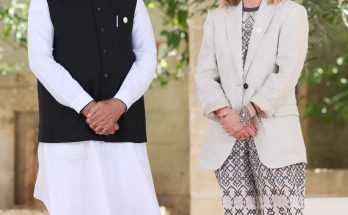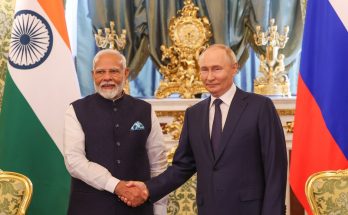 The arc of prosperity between India and South Korea has widened to encompass new horizons. New Delhi and Northeast Asia’s economic powerhouse have unveiled a roadmap for enhanced cooperation in trade and investment, defence, railways, healthcare, telecommunications, defence and cyber security.
The arc of prosperity between India and South Korea has widened to encompass new horizons. New Delhi and Northeast Asia’s economic powerhouse have unveiled a roadmap for enhanced cooperation in trade and investment, defence, railways, healthcare, telecommunications, defence and cyber security.
Dovetailing India’s Act East policy and South Korea’s ‘New Southern strategy,” which envisages New Delhi as a key partner of Seoul, Prime Minister Narendra Modi and South Korea’s President Moon Jae-in held wide-ranging talks in New Delhi on July 10 and declared their joint resolve to more than double bilateral trade to $50 billion by 2030. This economic bonding was telescoped in the joint inauguration of a new Samsung factory by the two leaders on the outskirts of Delhi, which has been billed as the world’s largest mobile phone manufacturing plant. The plant’s inauguration has come as a big boost for PM Modi’s Make in India campaign as the $728 million facility is expected to create more than 2000 jobs in India.
“Going forward I hope that more Korean companies will invest in India so that the foundation for mutual prosperity can be further expanded,” Mr Moon said after holding talks with Mr Modi. Bilateral trade is currently estimated to be over $20 billion, with around $16 billion surplus in favour of South Korea.
 The visit by President Moon has raised the bar for Seoul-Delhi partnership as the two countries signed 11 agreements and agreed to explore opportunities for partnering in third countries.
The visit by President Moon has raised the bar for Seoul-Delhi partnership as the two countries signed 11 agreements and agreed to explore opportunities for partnering in third countries.
The agreements signed between India and South Korea included intensifying negotiations to upgrade the 2009 ‘comprehensive economic partnership agreement’ and expand cooperation in maritime security, artificial intelligence, railways, healthcare, biotechnology, telecommunications and cyber security.
Partnering in Afghanistan
Imparting a strategic orientation to their burgeoning partnership, the two countries also agreed to focus on exploring new avenues of tripartite partnership for development in third countries. This tripartite collaboration could begin with joint cooperation in capacity building programmes in Afghanistan, the strategically located country where India has already pledged over $2 billion in a slew of reconstruction projects.
“South Korea and India will enhance military exchanges, training and experience-sharing, and research and development, including innovative technologies for mutual benefit. We also agreed to encourage our defence industries to intensify cooperation in this regard,” said the joint statement.
Focus on Korean peninsula
 Besides bilateral relations, regional and global issues also figured prominently in discussions, including the denuclearisation of the Korean peninsula.
Besides bilateral relations, regional and global issues also figured prominently in discussions, including the denuclearisation of the Korean peninsula.
India has welcomed the US-North Korea talks in Singapore on June 12 and termed it as a positive development. During his talks, PM Modi lauded President Moon for his “tireless efforts” towards denuclearization of the Korean peninsula. But in the same breath, he also reminded the South Korean leader about Pakistan’s links with North Korean nuclear programme. “During our talks, I told President Moon that proliferation linkages between North-East Asia and South Asia is a matter of concern to India. Therefore, India is also a stakeholder in the peace process. We will do our bit to ensure peace,” said Mr Modi.
Alluding to the widening strategic convergence between New Delhi and Seoul, Mr Modi said: “Now is the right time to lift the partnership to the next level.”
Author Profile

- Manish Chand is Founder-CEO and Editor-in-Chief of India Writes Network (www.indiawrites.org) and India and World, a pioneering magazine focused on international affairs. He is CEO/Director of TGII Media Private Limited, an India-based media, publishing, research and consultancy company.
Latest entries
 India and the WorldJuly 9, 2024Defying West, India sets $100 billion trade target with Russia
India and the WorldJuly 9, 2024Defying West, India sets $100 billion trade target with Russia India and the WorldJuly 5, 2024India at SCO: Takes swipe at Pakistan for cross-border terror, pushes alternative to BRI
India and the WorldJuly 5, 2024India at SCO: Takes swipe at Pakistan for cross-border terror, pushes alternative to BRI India and the WorldJune 14, 2024Modi’s Day 1 in Italy: Bonding with Britain, France
India and the WorldJune 14, 2024Modi’s Day 1 in Italy: Bonding with Britain, France India and the WorldJune 13, 2024G7 summit in Italy: Modi to showcase India as leader of Global South
India and the WorldJune 13, 2024G7 summit in Italy: Modi to showcase India as leader of Global South






